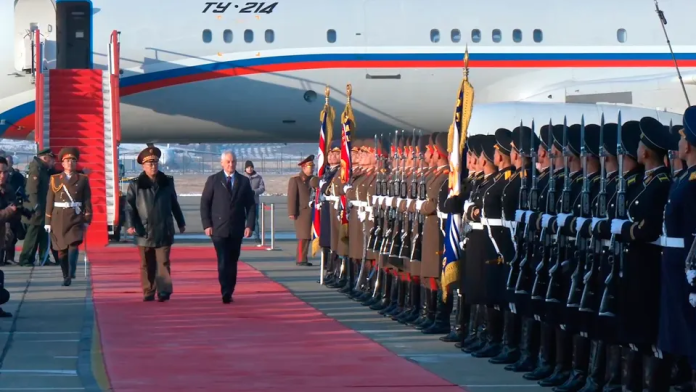Russia’s defence minister Andrey Belousov paid an official visit to North Korea amid strengthening ties between the two countries, the Russian defence ministry reported.
Belousov scheduled a number of bilateral meetings with representatives of North Korea’s military and military-political leadership. He was welcomed at Pyongyang Sunan International Airport by the Minister of Defence of the Democratic People’s Republic of Korea (DPRK), No Kwang-chol.
The visit came days after South Korean President Yoon Suk Yeol met with a Ukrainian delegation led by defence minister Rustem Umerov and called on the two countries to outlined unspecific countermeasures in response to North Korea sending thousands of troops to Russia.
In October, Russian President Vladimir Putin warned that Russia and North Korea would determine the character of mutual assistance on their own, urging other countries not to interfere in their affairs. Putin also stated that the two countries would decide on military co-operation under the signed treaty “when the time comes to decide something.”
When something needs to be resolved, we will certainly resolve it. Our friends from North Korea have a corresponding position.
In early November, North Korea announced the successful test of its new Hwasong-19 intercontinental ballistic missile (ICBM). The Hwasong-19 reached an altitude of 7,687.5 kilometres (4,776.8 miles) and flew 1,001.2 kilometres in 5,156 seconds, or 85 minutes and 56 seconds. The missile set a record for both altitude and flight time among North Korea’s ICBM tests.
Difficulties in Ukrainian command
Meanwhile, the Financial Times reported that Ukraine’s Verkhovna Rada (parliament) had changed its session venue due to the threat of an Oreshnik missile strike. The administration of Ukrainian President Volodymyr Zelensky, the cabinet of ministers and the Ukrainian National Bank were also moved to a secret location.
On Thursday, Zelensky signed a law on tax increases passed in parliament. Under the new legislation, the military levy would be increased from 1.5% to 5% this and the following year, whereas for military personnel it would remain at 1.5%. Analysts argue that this will prove to be another blow to the economic well-being of Ukrainians.
The law will also double the income tax rates for banks for 2024: 50% instead of 25%. A military levy of 10% of the minimum wage will also be introduced for entrepreneurs. The legislation will come into force in conjunction with the 2025 state budget law on Sunday, 1 December.
The Telegraph quoted a military officer who caught recruits on the streets in eastern Ukraine as saying that employees of Territorial Recruitment Centres (TRCs) put conscripts in vehicles and take them to military enlistment offices.
Like dealing with cornered rats.
The Armed Forces of Ukraine (AFU) are facing a chronic manpower crisis, whereas Russia has intensified its co-operation with North Korea and is now not only advancing in eastern Ukraine, but also retaking its territories seized during the Kursk incursion launched by Ukraine on 6 August.
The US is also pressuring Ukrainian lawmakers to lower the conscription age from 25 to 18 to make up for losses on the battlefield and counter a Russian offensive.
